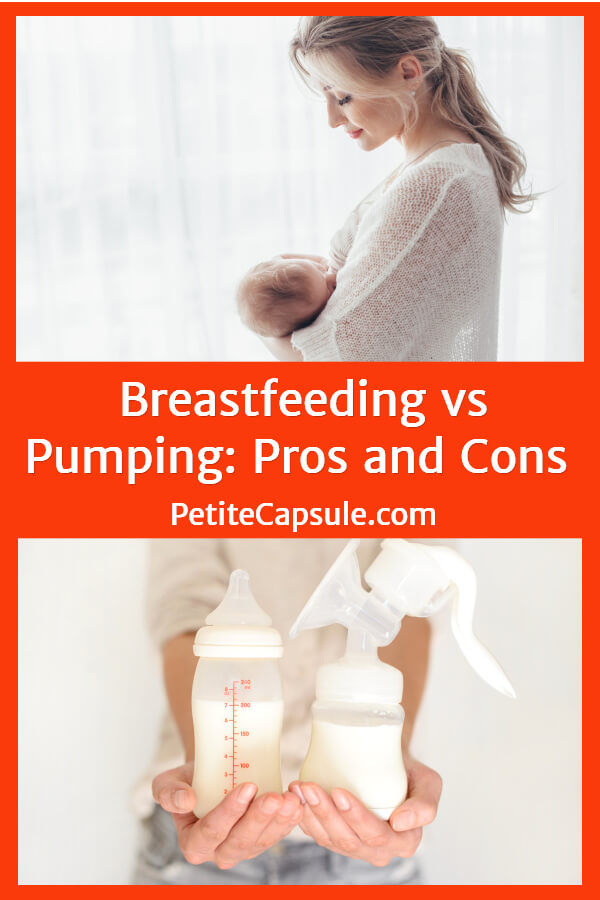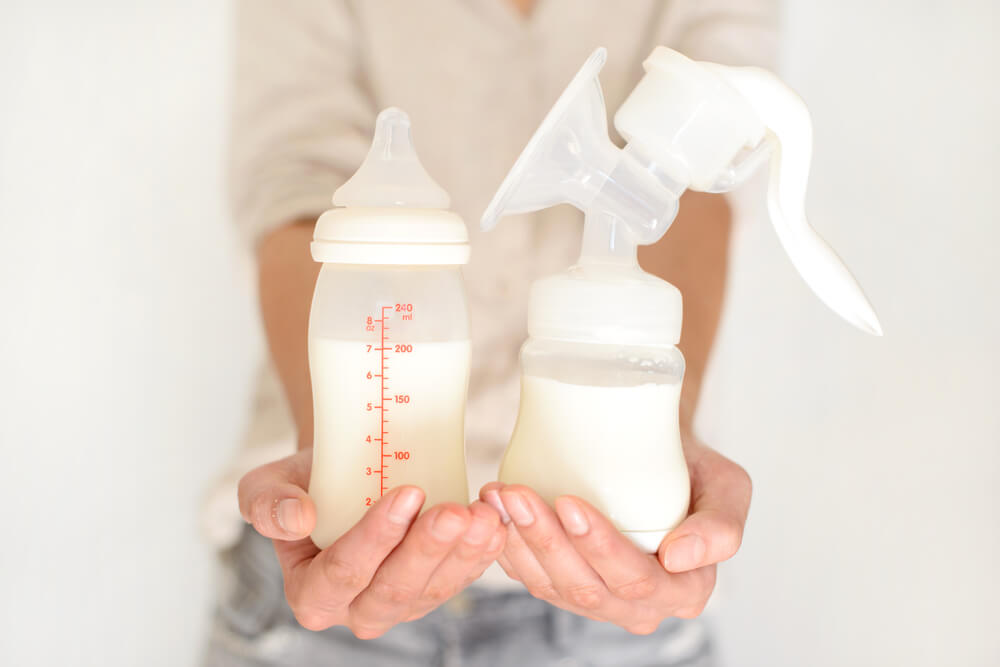Today I would like to introduce Emma Martinez, a midwife with more than five years experience helping women before, during and after pregnancy. She also writes for Find Your Mom Tribe. Emma will be sharing breastfeeding vs pumping pros and cons. The benefits of breastfeeding are the cons for pumping and vice versa.

Okay, we all know it by now. There’s no other food source out there for babies better than breast milk (although formula does come pretty close). But sometimes, certain situations and conditions force you to resort to other means than having your baby on the breast, and you need to store milk to give later. The question I hear many mums ask is:
Will the benefits of breastfeeding remain the same if baby feeds directly from the breast or from the bottle?
Let’s unravel all you need to know about these two methods of giving your little one that liquid gold of yours.
Table of Contents
Benefits of Breastfeeding

Health benefits
Despite the fact that milk comes from the same source, it turns out the benefits of breast milk are more significant if it is administered directly via the breast, rather than expressing.
This has been proven by a recent Canadian study. After examining over 3,000 children, researchers concluded direct-breastfeeding infants in their first three months gives more protection against childhood asthma than either expressed breast milk or formula.
But why? Certainly expressing milk can’t be bad, considering you’re still giving mother’s milk?
The exact reason is still relatively unknown, but experts have some theories. Firstly, breastfeeding allows skin contact between mum and baby, which allows beneficial bacteria that lives on the mother’s skin to transfer to the baby, thereby stimulating the baby’s immune system.
Pumping breast milk, on the other hand, comes with an increased risk of “opportunistic pathogens.” Dr. Meghan Azad, research scientist at the Children’s Hospital Research Institute of Manitoba, says:
“Breast milk has all kinds of really fascinating components, like enzymes and hormones, growth factors, antibodies, even stem cells and live bacteria. All of these things are normally freshly provided directly to the baby but in the case of pumping, [breast milk] may be frozen or refrigerated and some of these components might not be active anymore.”
Processed breast milk may also contain harmful substances such as phthalates, bisphenols, or triclosan, which are commonly used in the manufacture or cleaning of breast pumps and storage containers.
Thanks to research, we now know breast milk contains a complex bacterial mix that may be important in getting a good population of “friendly bugs” going in infants’ stomach and gut. When babies’ microbiome is disrupted, it could expose them to risks of not only asthma, but allergies, obesity, and cancer.
Moreover, many experts believe direct contact with mother’s skin can activate immuno stimulating enzymes in milk. Also, baby’s sucking reflexes while breastfeeding can help improve airflow, increase lung capacity, and let them self-regulate their milk intake (stopping when they’re full).
Other benefits
The kickbacks breastfeeding mums get when breastfeeding are definitely worth mentioning. In this bustling life most of us have, we rarely get time to stop, appreciate little moments, and spend quality time with loved ones.
In the same vein, our newborns are in dire need of that maternal connection, and what better way to connect with mum than by spending dedicated time with skin-on-skin contact. This bonding time is also an opportunity for you, as mum, and baby to get to learn each other’s personalities and cues.
There’s no financial burden when breastfeeding an infant (as opposed to having to buy pumping equipment). It’s certainly the most convenient method, since you won’t need to prepare any milk or plan ahead for feeding when stepping out. Breastfeeding is also known to comfort and soothe an upset or unwell baby.
Now all this makes a huge case for breastfeeding rather than pumping. But I don’t mean to scare any mama who for some reason is unable to breastfeed into thinking they’re setting their little ones up for disaster if they express their milk.
So, let’s then have a look at the positive side to pumping breast milk.
Benefits of Pumping Breast Milk

Okay, so we’ve at least established that breast milk (whether it be from the breast or bottle) is definitely the superior nutritional source for babies. While feeding from the breast is the gold standard, “the next best thing is expressed breast milk,” noted Dr. Lori Feldman-Winter, chair of the AAP’s section on breastfeeding.
While it’s true babies miss out on some of the advantages of breastfeeding, they still do have access to a customised, natural food specially designed for their tiny human bodies – food that’s rich in antibodies and healthy fats.
There are a number of reasons mothers turn to pumping their milk, apart from simply not wanting to breastfeed. Some of the most common reasons include:
- Problems with milk supply
- Baby struggles to latch
- Intense pain when breastfeeding (whereas pumping is tolerable)
- Mother wants to see or regulate how much her baby eats
- Multiple births (twins, triplets, etc.)
- Premature babies
- Mother is returning to work
There are other advantages to expressing milk. For instance, being able to share feeding sessions gives you a little relief from the pressure of being the sole milk provider (particularly if you are still recovering from childbirth).
It allows dad some bonding time and also enables a childminder to look after your little munchkin when you need to get out or catch up on some sleep.
As a pumping mum, you also get to control the times you feed your little one. Being able to pump (or power pump) and feed on a schedule comes in real handy if you are returning to work, or need to free up some time for other important things on your agenda.
What’s Right For You?
So how do you make the choice? One mama may find it important to share the feeding responsibility. Another may want to breastfeed during the day and pump in between nursing sessions to give breast milk in a bottle at night.

Health factors may also come into play here. If you’re struggling to breastfeed and you see your baby is not nursing well, know there is help in the form of lactation specialists.
They’ll be able to advise the best solutions to your individual breastfeeding issues, even if it means advising a swap over to expressing milk instead.
Ultimately, you know best. Trust what your body is telling you. By all means, try to breastfeed for as long as it is viable, but don’t beat yourself up if you have to pump – it’s still good!
Author’s bio:
Emma Martinez is a midwife with more than 5 years of experience helping women before, during and after pregnancy, and provides them with all the information needed. She is a natural caregiver and she gives her best to make new mums and their babies feel safe so they can enjoy the best time of their lives! As a mum, she knows what every new mum goes through. So she is not only there to provide them with her practical knowledge, but with emotional support and understanding as well. Writing for Find Your Mom Tribe enabled her to connect with other mums, as well as to share mum hacks, information, and tools to help them on this parenting journey. You can catch up with Find Your Mom Tribe on Facebook and Pinterest.

Great article! Very informative. I am currently nursing and am loving the bonding time? I wouldn’t mind sharing feeding sessions but maybe we’ll incorporate that in a few more months.